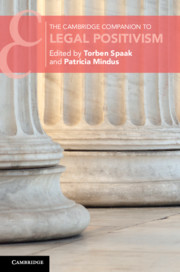Book contents
- The Cambridge Companion to Legal Positivism
- Cambridge Companions to Law
- The Cambridge Companion to Legal Positivism
- Copyright page
- Contents
- Figures
- Contributors
- Acknowledgements
- 1 Introduction
- Part I Fundamentals
- Part II History
- Part III Central Figures
- 9 Jeremy Bentham and the Origins of Legal Positivism
- 10 John Austin
- 11 The Normative Power of the Factual: Georg Jellinek’s Phenomenological Theory of Reflective Legal Positivism
- 12 Hans Kelsen’s Non-Reductive Positivism
- 13 The Legal Positivism of H. L. A. Hart
- 14 From Savigny to Linguistic Analysis: Legal Positivism through Bobbio’s Eyes
- 15 Joseph Raz’s Approach to Legal Positivism
- 16 Bulygin’s Analytical Legal Positivism
- Part IV Main Tenets
- Part V Normativity and Values
- Part VI Critique
- Index
- References
10 - John Austin
from Part III - Central Figures
Published online by Cambridge University Press: 21 January 2021
- The Cambridge Companion to Legal Positivism
- Cambridge Companions to Law
- The Cambridge Companion to Legal Positivism
- Copyright page
- Contents
- Figures
- Contributors
- Acknowledgements
- 1 Introduction
- Part I Fundamentals
- Part II History
- Part III Central Figures
- 9 Jeremy Bentham and the Origins of Legal Positivism
- 10 John Austin
- 11 The Normative Power of the Factual: Georg Jellinek’s Phenomenological Theory of Reflective Legal Positivism
- 12 Hans Kelsen’s Non-Reductive Positivism
- 13 The Legal Positivism of H. L. A. Hart
- 14 From Savigny to Linguistic Analysis: Legal Positivism through Bobbio’s Eyes
- 15 Joseph Raz’s Approach to Legal Positivism
- 16 Bulygin’s Analytical Legal Positivism
- Part IV Main Tenets
- Part V Normativity and Values
- Part VI Critique
- Index
- References
Summary
As Lobban explains, Austin thought of jurisprudence as the study of concepts, principles and distinctions that are common to various, possibly only mature, legal systems. He considers Austin’s command theory and concept of a sovereign and Austin’s thoughts on the relation between law and morality and on legal reasoning and judge-made law. On Austin’s analysis, laws properly so-called, as distinguished from rules of positive morality, are commands issued by the sovereign to the subjects, and that something is a command only if there is a sanction behind it. Lobban considers the objection that the idea of a habit of obedience cannot account for the legal authority of the lawmaker, for the idea of a succession of lawmakers or for the idea of a legally limited lawmaker. Austin argued that there is no necessary connection between law and morality, defended a version of rule-utilitarianism and held that the principle of utility is a good index to divine law. He advocated a textual approach to the interpretation of statutes, holding that the law in a precedent is to be found in its ratio decidendi and that customary rules do not become legal rules until they are recognised by courts.
- Type
- Chapter
- Information
- The Cambridge Companion to Legal Positivism , pp. 225 - 247Publisher: Cambridge University PressPrint publication year: 2021
References
- 1
- Cited by

